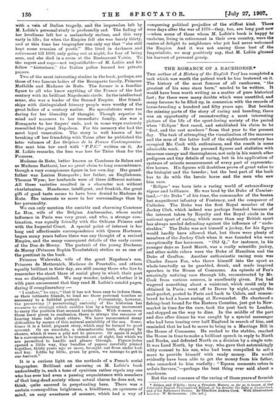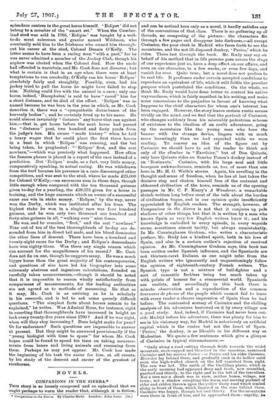THE ROMANCE OF A RACEHORSE.*
THE author of A History of the English Turf has completed A task which was worth the patient work he has bestowed on it. The history of the most famous of all racehorses, "the greatest of his sons since born," needed to be written. It would have been worth writing as a matter of pure historical fact ; for there were many doubts which were unsettled, and many lacunae to be filled up, in connexion with the records of horse-breeding a hundred and fifty years ago. But besides the missing parts of the story of raeing and breeding, there was an opportunity of reconstructing a most interesting picture of the life of the sport-loving society of the period when 'Eclipse' first raced, and established his claim to be "first, and the rest nowhere" from that year to the present day. The task of attempting the visualisation of the manners and the men of the latter half of the eighteenth century has occupied Mr. Cook with enthusiasm, and the result is some admirable work. He has pursued figures and statistics with immense energy and thoroughness, not only in his search after pedigrees and tiny details of racing, but in his application of systems of minute measurement of every part of representa- tive horses. His figures will doubtless prove of great value to the biologist and the breeder; but the best part of the book has to do with the heroic horse and the men who saw him race.
'Eclipse' was born into a racing world of extraordinary vigour and brilliance. He was bred by the Duke of Cumber- land,—" the Duke" of his time, the commander of the beaten but magnificent infantry of Fontenoy, and the conqueror of Culloden. The Duke was the first Royal member of the Jockey Club, which indeed was perhaps founded because of the interest taken by Royalty and the Royal circle in the national sport of racing, which more than any British sport has always needed defending against the influence of "unde- sirables." The Duke was not himself a jockey, for his figure would hardly have allowed that, but there were plenty of members of the Jockey Club when it was founded who were exceptionally fine horsemen. "Old Q.," for instance, in hie younger days as Lord March, was a really scientific jockey, and other noble riders were the Duke of Hamilton and the Duke of Grafton. Another enthusiastic racing man was Charles James Fox, who threw himself into the sport as whole-heartedly as he gambled, drank, and made inspired speeches in the House of Commons. An episode of Fox's amazingly untiring race through life, reconstructed by Mt. Cook from various sources, is excellently given. Fox had wagered something about a waistcoat, which could only be obtained in Paris ; went off to Dover by night, caught the mail-packet, posted to Paris and back to Calais, and remem- bered be had a horse racing at Newmarket. Ho chartered a fishing-boat bound for the Eastern Counties, just got to New- market in time for the race, took the post back to Londmi, and stopped on the way to dine. In the middle of the port and dice after dinner he was caught by a special messenger who had been tearing over half England in search of him, and reminded that be had to move to bring in a Marriage Bill in the House of Commons. He rushed to the stables, reached the Rouse in time to make a brilliant speech in reply to North and Burke, and defeated North on a division by a single vote. It was Lord North, by the way, who gave that astonishingly witty counsel to his son, who had been compelled to sell a mare to provide himself with ready money. He would evidently have been able to get the money from his father, who remarked to him ruefully : " Equam memento rebus in arduis Servare,"—perhaps the best thing ever said about a racehorse.
But the real romance of the racing of those years of feverish
• Eclipse ead O'Kelly : being a Complete History so for as is knows, of apt Celebrated English Thoroughbred Eclipse, of his Breeder the Duke of Cumberland, and of his Subsequent Owners. By Theodore Andrea Cook. With Illustrations. London: W. Heinemann. 1219. not.] splendour centres ht the great horse himself. 'Eclipse' did not belong to a member of the "smart set." When the Cumber- land stud was sold in 1765, 'Eclipse' was bought by a well- to-do meat salesman and grazier named Wildman, who eventually sold him to the Irishman who owned him through- out his career at the stud, Colonel Dennis O'Kelly. The latter seents to hare been a racing than "with a past," for he was never admitted a member of the Jockey Club, though his nephew was elected when the Colonel died. How the uncle had offended is tincertain, and Mr. Cook does not discover; but what is certain is that in an age when there were at least temptations to run crookedly, O'Kelly ran his horse Eclipse' absolutely fairly and straightly. Possibly, even, had his jockey tried to pull the horse he might have failed to stop him. Nothing could live with the animal in a race ; only one horse, indeed, Bucephalus,' is said to have "raced" him for a short distance, and he died of the effort. 'Eclipse' was so named because be was born in the year in which, as Mr. Cook describes it, there was a "sympathetic disturbance of the heavenly bodies "; and he certainly lived up to his name. He could almost invariably "distance" any horse that ran against him,—that is, get home before the next horse had passed the "distance" poet, two hundred and forty yards from the judge's bOx. His owner "made history" when he laid a heavy wager that he could place the first three horses in a heat in which 'Eclipse' was running, and the bet being taken, he prophesied " Eclipse ' first, and the rest nowhere,"—which was precisely what happened. How often the famous phrase is placed in a report of the race instead of a prediction. But 'Eclipse' made, as a fact, very little money, comparatively speaking, in actual racing. He was withdrawn from the turf because his presence in a race discouraged other competitors, and was sent to the stud, where he made 225,000 for Colonel O'Kelly,—an enormous sum in those days, though little enough when compared with the ten thousand guineas given to-day for a yearling, the f.:39,375 given for a horse in training, and the huge amounts which an owner of a successful racer can win in stake Money. 'Eclipse,' by the way, never Won the Derby, which was instituted after his time. The highest stake he won in a single race was four hundred guineas, and he won only two thousand one hundred and forty-nine guineas in all, "walking over" nine times.
He was, and he remains, "first," and the rest "nowhere." Nine out of ten of the best thoroughbreds of to-day are de- scended from him in direct tail male, and his blood dominates the other lines of descent. There have been a hundred and twenty-eight races for the Derby ; and Eclipse's descendants have won eighty-three. Was there any single reason which tan account for the magnificence of his record ? Mr. Cook does not fix on one, though he suggests many. He was a much bigger horse than the great majority of his contemporaries, and questions of size have led his biographer into some extremely abstruse and ingenious calculations, founded on carefully taken measurements,—though it should be noted that it is impossible to reason wholly satisfactorily from comparisons of measurements, for the leading authorities are not agreed as to methods of measuring. Be that as it May, Mr. Cook is as untiring as he is scholarly ita his research, and is led to ask some queerly difficult questions. "The simplest facts about horses remain to be explained," he writes. Was Admiral Rous, for instance, right in asserting that thoroughbreds have increased in height an filch every twenty-five years since 1700? And if he was right, when will they stop increasing ? Does height make for pace? Or for endurance P Such questions are impossible to answer at present. nut they might be answered provisionally if the "young biologist with time to spare" for whom Mr. Cook hopes could be found to spend his time on taking measure- ments from bones and living animals and reasoning from them. Perhaps he may yet appear. Mr. Cook has made the beginning of his task the easier for him, at all events, by his study of the descent and career of the greatest of racehorses.







































 Previous page
Previous page